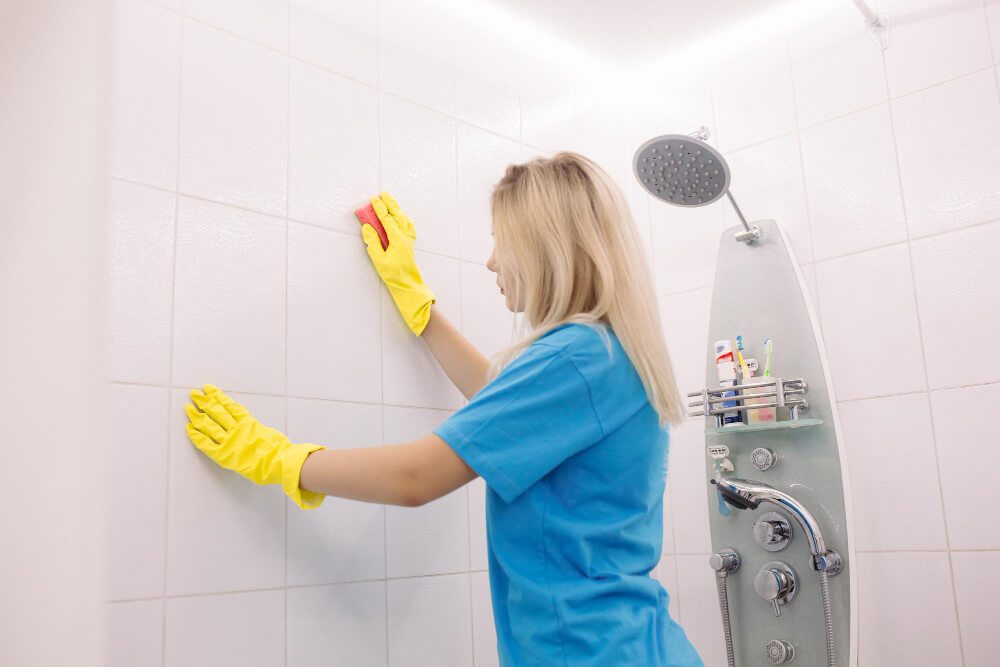Top blog articles
Have you ever stepped out of a hot shower, only to notice mysterious yellow streaks running down your bathroom walls? Are you wondering, “Why are my bathroom walls dripping yellow”?
If you’ve spotted yellow stains or even sticky yellow drips on your bathroom walls, it’s time to worry a bit. This unsightly problem is not just about looks. It could be a serious issue that might come back to bite you later. Let’s understand what causes these yellow marks, how to clean them, and, most importantly, how to keep them from coming back. Let’s begin.
So, Why Are My Bathroom Walls Dripping Yellow?
Seeing yellow drips on clean, painted walls can be both alarming and gross. But don’t worry, it’s not some plumbing disaster waiting to happen. The explanation is usually much simpler and less expensive to fix.
Here are the most common reasons for yellow stains on bathroom walls:
Condensation from Hot Showers
After a hot shower, steam condenses on your bathroom walls, especially if you don’t have an exhaust fan or you forget to open windows. This moisture can attract dust, dirt, and microscopic particles that settle on the damp surface. Over time, these particles mix with the moisture and start forming those unsightly yellow streaks. Think of it as steam “melting” airborne grime and redepositing it on your walls.
Residual Soap Scum and Body Oils
Soap scum isn’t just something that clings to shower doors and tiles. Tiny soap particles float in the air, especially during a steamy shower, and can settle on the walls. When combined with body oils or lotion residue in the air, they can leave yellow drips as the moisture evaporates.
Tobacco Smoke or Scented Candles
If anyone smokes in the house (even occasionally) or frequently burns candles in the bathroom, the smoke and residue can leave a yellowish film on the walls. Over time, moisture from hot showers causes this film to streak downward, creating those telltale yellow stains.
Mold and Mildew Buildup
Bathrooms are naturally humid, making them a perfect breeding ground for mold and mildew. Sometimes, these yellow streaks are early signs of mold and mildew growth, especially in corners or places that stay damp. Check to see if the streaks feel slimy or have a musty odor—this could be mold. Remember, mold often starts off as yellow before turning darker as it matures.
Hard Water and Leaky Fixtures
Hard water contains minerals such as iron that, when they come in contact with bathroom walls (either via splashing or humidity), can leave behind yellow stains. If there’s a small leak from a pipe behind the wall, it could also cause staining that looks like yellow drips.
Surfactant Leaching
This is one of the most common causes of yellow drips after a hot shower. Surfactants are ingredients in paint that can leach out when exposed to high humidity and moisture, especially if the paint wasn’t designed for bathroom use or the walls weren’t properly prepped before painting. The result? Yellowish streaks or drips that seem to appear out of nowhere, especially in poorly ventilated bathrooms
How to Clean Yellow Drips Off Your Bathroom Walls?

The good news? You can usually remove yellow stains with a little elbow grease and some basic cleaning solutions. Here’s what works best:
Vinegar and Baking Soda
- Mix 1 part vinegar with 1 part water and spray the solution on the stains.
- Let it sit for 10 minutes.
- Scrub gently with a sponge or microfiber cloth.
- For stubborn marks, add baking soda and scrub again.
Hydrogen Peroxide
- Great for suspected mold and mildew.
- Spray directly on the affected area and let it sit for 15 minutes.
- Wipe clean and allow the area to dry completely.
Commercial Bathroom Cleaners
- Look for cleaners labeled for soap scum and hard water stains.
- Use gloves and ensure the room is well-ventilated when applying.
How to Keep Your Bathroom Walls Clean and Yellow-Free
Prevention is always better than scrubbing walls every week. Here’s how to keep your bathroom dry, clean, and free of yellow streaks:
Use Your Exhaust Fan Religiously For Proper Ventilation
- Turn the fan on during and for 20 minutes after every hot shower.
- If your bathroom doesn’t have one, install a high-quality exhaust fan—it’s worth the investment.
Open Windows After Showering
- Even cracking a window for 10 minutes can help reduce humidity.
- It promotes airflow and dries the walls faster.
Regular Cleaning Routine
- Wipe down your bathroom walls once a week using a vinegar solution.
- Clean bathroom mirrors and light fixtures too as they too collect grime that floats onto walls.
Repaint with Mold-Resistant Paint
- If your paint is old or chipping, consider repainting.
- Use a semi-gloss, mold- and mildew-resistant paint made for bathrooms.
Keep an Eye on Leaks
- Regularly inspect for leaky pipes or damp areas on the ceiling or behind toilets.
- Consult a professional if the leak looks serious.
When to Call a Pro
If your yellow stains keep coming back no matter what you do, it could signal:
- A hidden leak behind the walls
- Mold is growing inside the drywall
- Inadequate insulation is causing persistent condensation
In such cases, it’s best to call a plumber or mold remediation expert.
Final Thoughts
Yellow drips on your bathroom walls are a sign that your bathroom needs a little TLC—whether it’s better ventilation, regular cleaning, or a paint upgrade. By understanding the causes and following these practical tips, you can keep your bathroom fresh, clean, and free of those pesky yellow stains for good.









